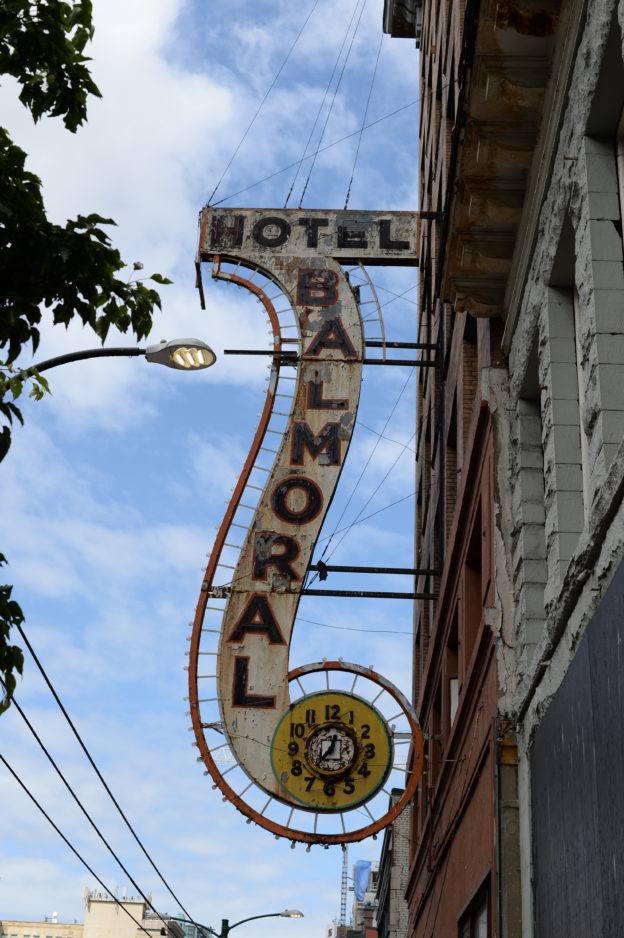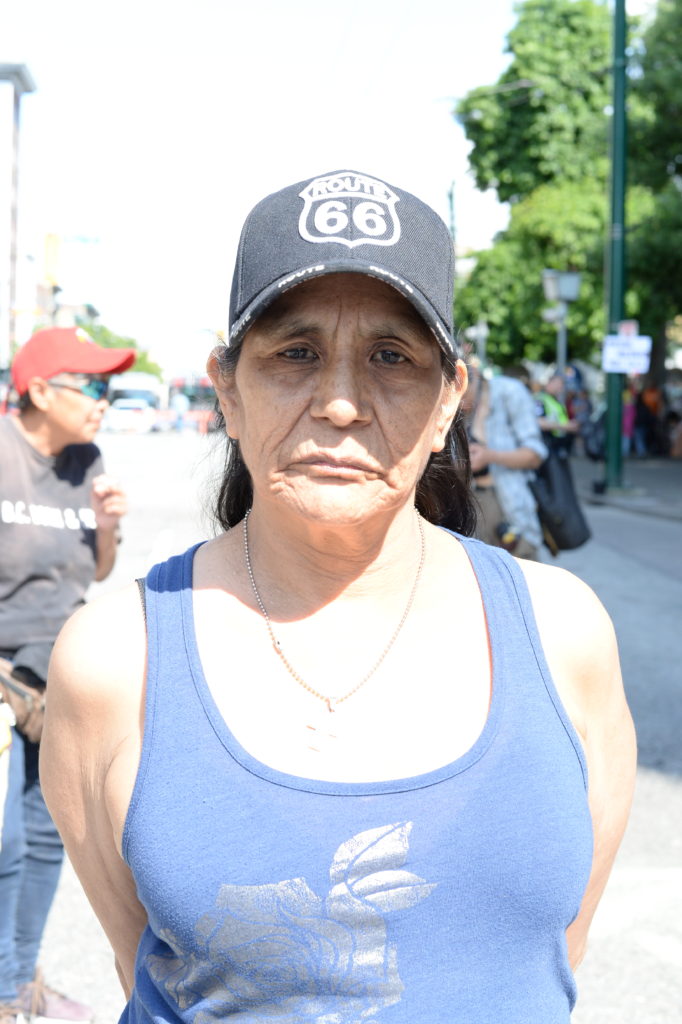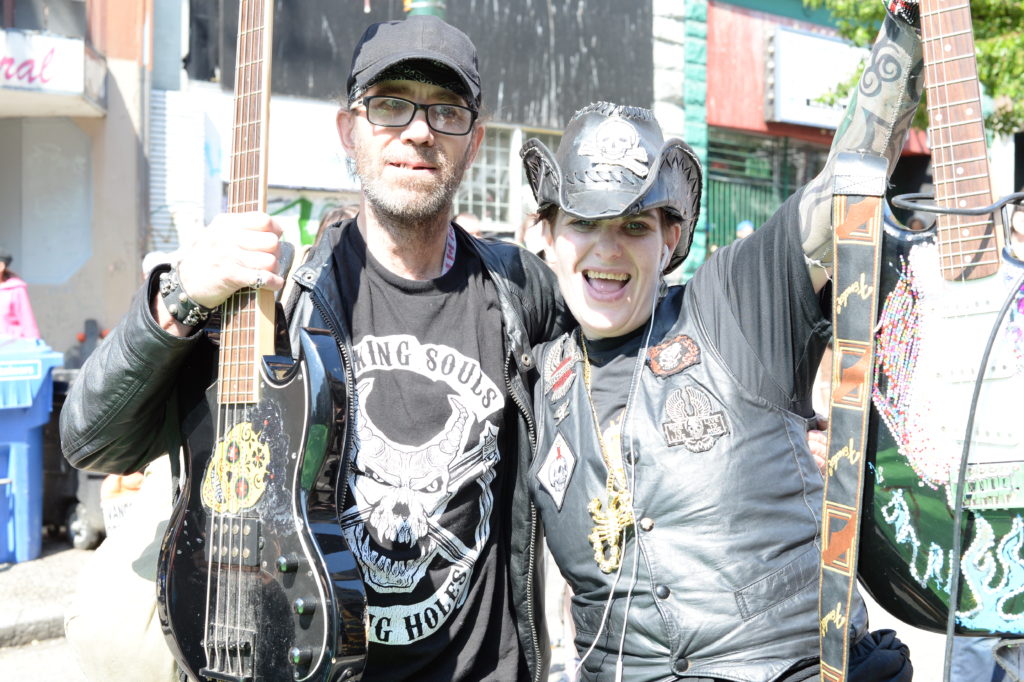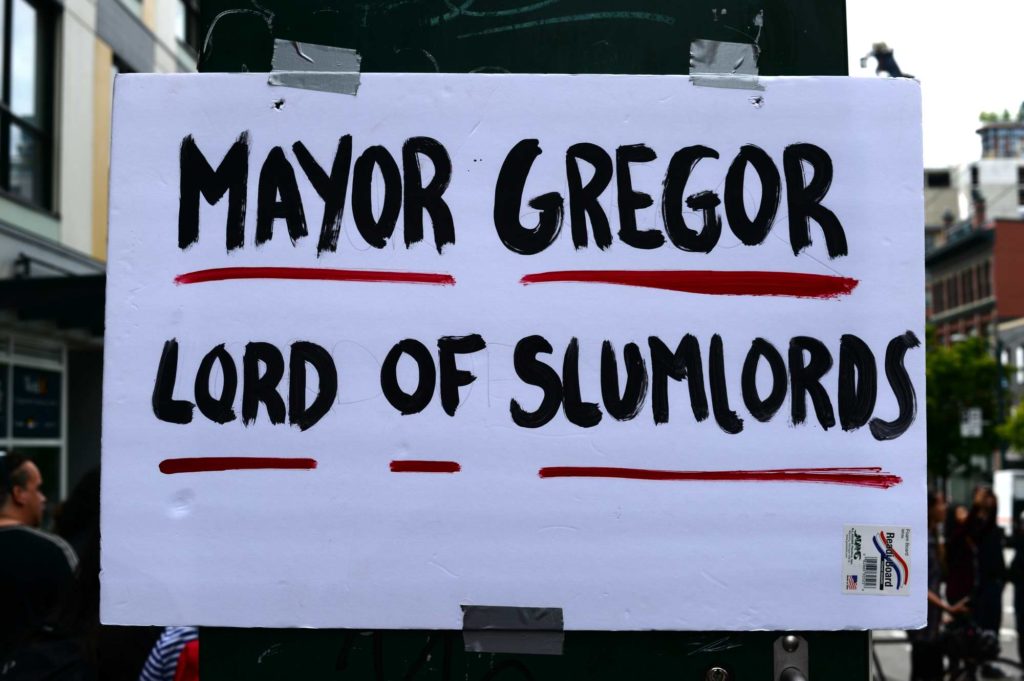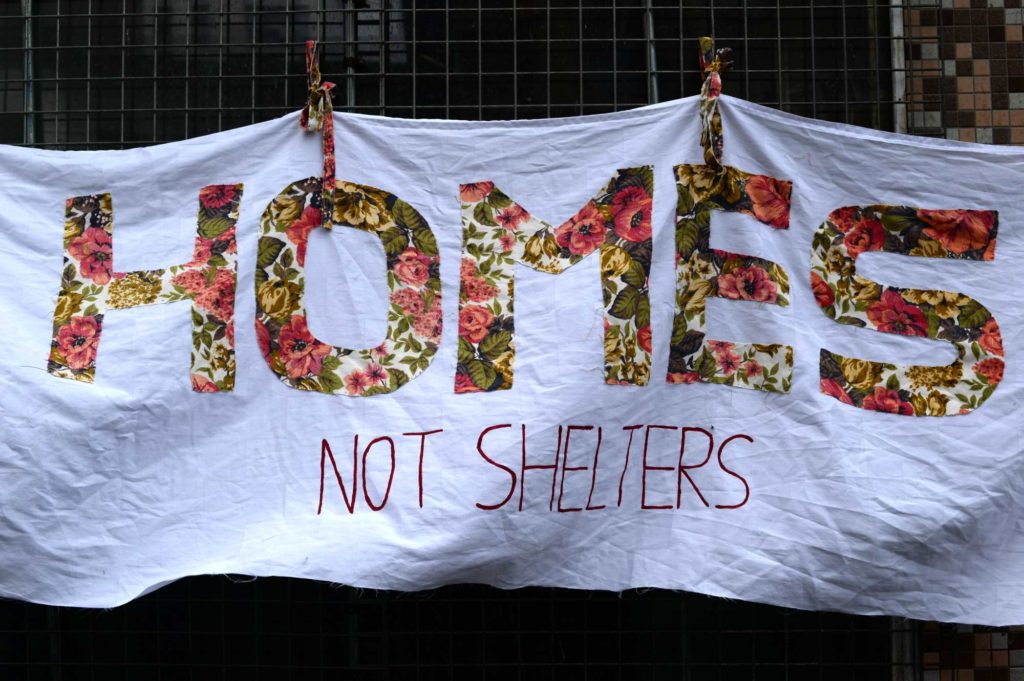“Money doesn’t solve everyone’s problems, community does,” proclaims Balmoral resident Amanda Germann.
On June 2, 2017, the city gave residents of the Balmoral Hotel, one of Vancouver’s most neglected single-resident occupancy (SRO) buildings on the Downtown Eastside (DTES), an eviction notice for June 12. The notorious slumlords – the Sahota family that own the building and other real estate in the area, totaling $130 million – were ordered to vacate the building after engineers found significant structural problems on May 30th. The Balmoral Hotel was home to around 150 of the city’s low-income people, over 50% of which are people of colour. After pressure from tenants and activists, BC Housing committed to securing housing for everyone and the Sahotas were forced to offer a small amount of relocation assistance. However, tenants and housing advocates criticize the government for failing to enforce bylaws and insist that problem landlords should be fined for renting out such deplorable living conditions. Over three decades of neoliberalism in British Columbia ensures that issues such as the Balmoral are not an anomaly.
The tenants have struggled for years to have their voices heard by the Sahota family and municipal government while the building has continued to deteriorate. Black mold, rats, cockroaches and bedbugs, along with rotting structural beams in the building’s foundation, are the results of negligence spanning decades. Recently, occupants decided to take matters into their own hands by organizing to stand up for their rights and address the safety and health hazards of their living conditions. Various community activist groups and organizations such as the SRO Collaborative, the Vancouver Tenants Union and the DTES Women’s Centre have stepped in to support the DTES tenants and their struggle for dignity.
Sam Dharamapla, a former book-keeper who worked at the Balmoral and other Sahota-owned hotels for ten years, joined the tenants’ struggle after being fired from his job a year ago. At the June 11th block party rally, Dharamapla proclaimed that the Balmoral is a symbol of this “historical movement of the Downtown Eastside.”
Roberta Westenberg, a 57-year-old tenant at the Balmoral, who has lived there for over a year, described her living conditions to the crowd at the rally despite feeling ill after recently returning from the hospital. “My ceiling is falling down, my walls are cracking to the floor, I’ve got water flush coming through my place, [and] people urinating in the room up top,” she detailed. “I smell death every day.” Roberta has asked since she moved into the Balmoral for her room to be cleaned up but no action was taken. She thanked the crowd for gathering and pleaded for people to return the following day to support her and the other tenants on eviction day.
Mark, a tenant who also spoke at the rally on Sunday, recalled being unable to access water to put out a fire in the building. He stated that after he complained to management that his hot water was not working, the water was shut off completely. This is extremely problematic in light of the recent Grenfell Tower tragedy in London where the BBC reports at least 70 people died when the building was engulfed in flames after “years of neglect” by the local government, which many believe could have been prevented. Mark also witnessed the management at the Balmoral use physical violence as a response to psychotic breakdowns where tenants were beaten with sticks. He insisted that it is essential to spread awareness about the “unequal human rights situation” that people are experiencing within many of Vancouver’s SRO buildings. He then addressed the broader lack of economic opportunity and stated, “I can certainly see how a lot of people end up resorting to crime. This system is designed to make people resort to crime because it doesn’t give any options.”
DJ Joe was a Balmoral resident that lived in the building for 27 years, since 1989. She stated that two years ago she started taking matters into her own hands after the Sahotas failed to address problems. “What if something like this happened in your place [where] you asked somebody for help and they ignored you, how would that make you feel?” Joe asked. She said that the back door has been broken for over two years, which has allowed squatters to occupy the building. She stated that the tenants have tried their best to take care of the building and she expressed her frustration about the notice being given only 12 days before eviction. Joe confirmed that she did have a place to live but that it was worse than the Balmoral but she had no other choice. “I have to take what I can get,” Joe stated. She told the Talon that “we’re going to fight for our rights and we gotta get the Sahotas outta Vancouver. The Sahotas are wanted. We’re going to put their name to shame!”
Amanda Germann and her partner Kevin Brown, two tenants of the Balmoral, described the living conditions and their interactions with the Sahota landlords to the Talon. “My experience living here has been nothing but a repeating, recurring nightmare,” Germann said, which has been plagued by poor health conditions from black mold. She also recalls tenants being physically abused by intruders and a number of suspected murders being labeled overdoses after inadequate police investigations.
Germann and Brown referred to the Sahotas as “scumlords” that care little about the tenants and all about money. “Money doesn’t solve everyone’s problems,” Germann proclaimed. “Community does.” In the eyes of the Sahotas, Brown stated, “all you are is a dollar sign, not a human.” They both voiced their rage that the Sahotas have left the Balmoral in such neglect that it has led to the eviction of all the tenants. However, they both confirmed on Sunday that they have found a new place to live and have no desire to ever live in the Balmoral again. Germann expressed her solidarity with fellow tenants at the Balmoral and vowed to support them in their struggle against the Sahotas.
Brown criticized Premier Christy Clark for failing to help the homeless while pocketing $50,000 in Liberal party campaign donations on top of her annual salary of $200,000. Homelessness has continued to climb in Vancouver since Clark first took office in 2011. The latest conservative count conducted on March 7 and 8, 2017, found that homelessness in Metro Vancouver has increased by 30% since 2014, affecting at least 3,605 people. Meanwhile, the 2016 Census found that there are 21,820 empty homes in Vancouver. British Columbia under the Clark provincial government is the only province in Canada without an official poverty reduction strategy, despite having the second-highest poverty rate in Canada. In January 2017, the Canadian Centre for Policy Alternatives called upon the provincial government to develop and implement a strategy. Out of all of the other provinces in Canada, BC also has the highest concentration of wealth, where the top 10% of its residents own 56.2% of the province’s total wealth and the bottom 50% of the population owns 3.2%.
Dennis Pilon, in his essay “British Columbia: Right-Wing Coalition Politics and Neoliberalism”, documents over three decades of neoliberal austerity cuts to social welfare and services in BC. It began with the “restraint” programs of Bill Bennett’s Social Credit government in 1983 and accelerated under Gordon Campbell’s BC Liberal Party, who implemented a 25% cut to income tax immediately after being elected to the provincial legislature in 2001. The provincial government continued to slash its spending on social services despite giving off the impression of a socially-minded budget. Pilon states that Gordon Campbell’s ““housing budget” offered tax cuts that people could apply to housing, if they wished. Such a market-oriented policy approach did little to help those genuinely in need of housing.” These neoliberal policies have only continued under the Clark government. For example, welfare rates have not increased since 2007 while inflation has increased at a yearly amount of 1.7%. This has effectively made the meager $610 allowance welfare recipients receive per month, $375 of which is to cover housing, worth less every year over the past decade. Pilon ends his article by proclaiming that “the lopsided legislative victory for the Liberals in 2001 (seventy-seven of seventy-nine seats) allowed Campbell to aggressively roll out neoliberal reforms with impunity. The failure of the BC NDP to fundamentally contest either phase of neoliberal restructuring meant that the Social Credit in 1986 and the Liberals in 2009 and 2013 paid only a modest electoral price for their unpopular market-oriented policies.”
This reduction in government social welfare spending thrust the responsibility of social housing into the hands of the private sector, where low-income people have little choice but to live in SROs owned by notorious slumlords such as the Sahotas. Furthermore, the City of Vancouver’s failure to hold SRO slumlords accountable to bylaws has only continued under Mayor Gregor Robertson on many accounts. Section 23.8 of the city’s Standards of Maintenance By-Law No. 5462 states that:
where any building or land does not comply with standards set out in this By-law, the Council may, by resolution, order that failure to remedy any default specified in such order within 60 days after service of such order, will result in the work being carried out by the City at the expense of the owner.
The city also has the authority to fine landlords a maximum of $10,000 for the violation of bylaws, which it has requested the province to increase. Asked about the inaction, Wendy Pederson, a housing advocate with the Vancouver Tenants Union, told the Talon that the city’s “inspections and legal department have been lazy, incompetent, and actually prejudiced against the tenants. They blame the tenants for the problems when really the tenants are shut down and don’t have the power to make complaints.” Pederson also mentioned that the tenants have received threats and other forms of intimidation including fear of violence and eviction for speaking out about their living conditions. She proclaimed that the city does not want to spend the money to house these people elsewhere and they know that some of these buildings need to be shut down. “So, [the city] is willfully looking the other way and hoping they can stretch this out as long as possible while they gentrify the DTES.”
Miloon Kothari, a former special rapporteur on housing for the United Nations, recently stated that Vancouver is “very quickly becoming an apartheid city.” Kothari told the Talon that in the ten-year period that he has been observing Vancouver, he has seen “more hyper-speculation”, “more hyper-gentrification”, and “there’s more of a concentration of poverty.” In comparison to his visit a decade ago, he has observed a clearer distinction between the rich and poor areas of Vancouver and he asserted that “there are no meaningful attempts to have a mixed-use city with people of different income levels living together.” He acknowledged that in communities like the DTES and Chinatown, low-income people are being pushed out by gentrification which contributes to the “classic definition of an apartheid city.” He pointed out that many attempts at mixed-use housing in Vancouver, such as the Woodwards Building, have only perpetuated segregation since the poor and wealthy have separate entrances. “That is not acceptable from a human rights perspective,” Kothari proclaimed. “Canada is supposed to be a country that upholds human rights…The approach being taken is one of housing as a commodity to be bought and sold and the results are what you see here,” he said, referring to the Balmoral. Furthermore, he recently told The Tyee that “social welfare policies have been victims of neoliberal policies,” which contributes to the increase in homelessness, “[costing] society more in the long run.”
He continued by stating that a better approach would be for Vancouver to declare itself as a “human rights city, a city for everyone who lives and works here. The city housing policy”, he said, “would be based on the rights of the most vulnerable first, to ensure that the most vulnerable have a place to live [with] the security of tenure so they are not evicted.” He clarified that, although the main concern is with the lowest income groups, this encompasses middle to upper middle-income tenants who are routinely affected by eviction. He ended by stating, “that there needs to be a complete radical shift and it’s not so radical in the sense that Canada has ratified all of the international instruments that protect the right to housing. So it’s just a matter of implementing those and there’s enough information, indicators and strategies available from the UN to be able to do that.” This is in stark contrast to the statements by the Cowichan Valley Liberal candidate Steve Housser who recently referred to the guaranteed right to housing as “communistic”.
The tenant organizing has finally spurred the government into action after years of inaction. The city recently spent $1.5 million reinforcing the structural integrity in the basement of the Balmoral, and BC Housing committed to housing everyone who was evicted on June 12. According to the DTES SRO Collaborative, as of June 16, every tenant that was evicted from the Balmoral had housing.
However, the fight for the right to housing still continues in the most expensive city in Canada. SRO Regent Hotel tenant Jack Gates filed a class action lawsuit in the summer of 2016 against the Sahotas and the city, which is currently in the court of appeals. Jason Gratl, the lawyer representing Gates in the lawsuit, also filed litigation on behalf of the Balmoral residents. These cases have the potential to set legal precedents where tenants could settle their grievances against landlords in the BC Supreme Court. Furthermore, SRO buidlings make up an integral portion of the low-income housing in the city, so it is imperative that these buildings remain affordable for the city’s many low-income residents once the living conditions have been improved. The Balmoral is one example of many neglected SROs throughout the Lower Mainland that has deteriorated under decades of neoliberal government policies in BC. Even though the most affected and marginalized have been tireless and resilient in this struggle, the responsibility to ensure access to adequate housing should not be solely placed upon their shoulders. All BC residents should demand these neoliberal policies and human rights abuses be addressed along with ensuring the right to housing.
For more information please follow the DTES SRO Collaborative and the Vancouver Tenants Union.
Special thanks to editors Eviatar, Ismail, Margaret-Anne and Tania.
